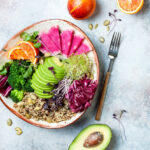Recipe for SUCCESS: Use dietary phytochemicals to lower your risk of multiple forms of cancer
 (NaturalHealth365) The microscopic bioactive plant chemicals in veggies, fruits, beans, and whole grains, referred to as phytochemicals, provide a wide array of nutritional benefits. Though you cannot see phytochemicals, they play an important role in human health.
(NaturalHealth365) The microscopic bioactive plant chemicals in veggies, fruits, beans, and whole grains, referred to as phytochemicals, provide a wide array of nutritional benefits. Though you cannot see phytochemicals, they play an important role in human health.
Also referred to as phytonutrients, phytochemicals protect against cancer and serve as an anticancer therapy. In fact, recent research on dietary phytochemicals reveals these tiny food components reduce the risk of prostate, breast, and thyroid cancer.
Here’s the inside scoop on how phytochemicals are helping win the battle against cancer and a quick look at the best ways to incorporate these nutrients into your diet.
The role of phytochemicals in preventing and fighting breast cancer
Fruits, vegetables, and beans contain phytochemicals that can help prevent breast cancer by targeting Nrf2, a regulatory factor critical in promoting antioxidant expression and combating harmful inflammation. For example, resveratrol and curcumin are two of the most highly regarded preventive agents against breast cancer development.
Nrf2 modulation eliminates unnecessary carcinogenic metabolites via the Ho-1 and NQ01 Phase II cytoprotective enzymes. This process effectively prevents the buildup of carcinogens that can lead to breast cancer.
Natural phytochemicals in fruits and veggies combat thyroid cancer
Thyroid cancer is a disease that affects just over 1% of the population, with approximately one million people in the United States currently living with this form of cancer. Sadly, more than 43,000 individuals die from thyroid cancer each year. Scientists are actively researching the role of phytochemicals in combating the development of this disease.
Discover a Simple and Effective Way to Remove Toxins: This is Jonathan's #1 choice for at-home detoxification. Special offer ends Feb. 16.
Phytochemicals, tiny bioactive components found in certain foods, have been shown to inhibit the growth of cancerous cells in the thyroid gland. In addition, these powerful compounds can alter signaling cascades and metabolic properties of cancer cells, ultimately shaping the mitochondrial membranes of thyroid cancer cells. Through these mechanisms, phytochemicals may play a vital role in preventing the development and progression of thyroid cancer.
Tiny compounds play a role in the battle against prostate cancer
Prostate cancer is a common malignancy affecting men worldwide, with an estimated 268,000 new cases expected in the United States alone this year. Thankfully, phytochemicals present a promising avenue for treating this disease.
Research has shown that phytochemicals derived from plants exhibit tumor cytotoxicity. Put simply, these plant compounds are toxic to cancer cells in the prostate gland. As such, these compounds may hold the key to unlocking effective treatments for prostate cancer, giving hope to millions of people worldwide.
How to add phytochemicals to your diet
While phytochemicals are present in many fruits, vegetables, and beans, it’s important to note that not all versions of these foods are created equal. To get the most out of these health-boosting compounds, it’s best to opt for organic produce that’s grown locally. If possible, consider growing your own organic vegetables to maximize your intake of phytochemicals. If you have no other option but to consume conventionally grown fruits and veggies, try to avoid the “dirty dozen” to minimize your exposure to cancer causing pesticides.
So, which foods contain the most phytochemicals?
Anthocyanin phytochemicals, shown to protect against tumor formation, heart disease, inflammation, and allergies, can be found in eggplant, purple cabbage, raisins, plums, strawberries, and elderberries. Phenolic phytochemicals are abundant in legumes and citrus fruits, while indole phytochemicals can be found in Brussels sprouts, turnips, kale, cabbage, broccoli, and bok choy.
Carotenoid phytochemicals, which are beneficial for skin and vision, are found in tomatoes, spinach, pink grapefruit, oranges, and parsley. And for those looking to fight cancer and extend longevity, look no further than blue and red fruits like blueberries and raspberries, which contain anthocyanin phytochemicals.
Sources for this article include:



